
President Xi Jinping chairs a virtual summit in Beijing on Tuesday commemorating the 30th anniversary of the establishment of diplomatic relations between China and five Central Asian countries. The leaders of Kazakhstan, Kyrgyzstan, Tajikistan, Turkmenistan and Uzbekistan participated in the summit. Photo: Xinhua
Editor's Note:A virtual summit marking the 30th anniversary of the establishment of diplomatic relations between China and five Central Asian countries was held on Tuesday in Beijing. How did China-Central Asia relations constantly usher in new stages over the past three decades? As the US is stepping up activities to penetrate the region, how should China and Central Asian countries strengthen efforts to advance cooperation with mutual benefits? Global Times (GT) interviewed Sheradil Baktygulov (Baktygulov), an independent political analyst based in Bishkek, Kyrgyzstan, via email.
GT:How do you comment on the development of China-Central Asia relations over the past 30 years? In which aspects can the relationship be called a model for a new type of international relations?
Baktygulov:In 1992 there were first wary steps towards each other in "building bridges" of mutual understanding between China and the Central Asian nations. China and newly independent Central Asian countries opened a new chapter of mutual diplomatic relations. 30 years, on one hand, is quite a short time for mankind, and on the other hand, this is a serious period already. It could be better described with a "leapfrog" metaphor. Over these 30 years, a new spirit of cooperation between Central Asian countries and China increases rapidly and it has withstood the test of time. This spirit is about mutual trust, mutual benefit, equality, consultation, respect for cultural diversity and pursuit of common development. These days, this spirit is widely known as the "Shanghai spirit" and can be found within the most significant Belt and Road Initiative, the Asian Infrastructure Investment Bank and other joint projects and initiatives.
Today, China has established with each of the Central Asian countries comprehensive strategic partnerships and modes of cooperation. The dynamics of these relations are very positive, and there are so many cases of progressive development in political, economic and other fields of bilateral and multilateral international cooperation.
The goals and problems facing the world powers such as China, the US and others are very large and more comprehensive than the goals and problems faced by the smaller countries. The national interests of small countries are mainly associated with adapting to the outside world and ensuring their own economic growth. The latest history of China-Central Asia relations proved that China never uses inequality of power in relation to the Central Asian countries. The Chinese policy takes a different approach. Thus, China-Central Asia cooperation is a never seen before model of cooperation between a power state and smaller states, because it goes far beyond the traditional geopolitical approach of a unipolar world (unilateralism) based on forceful pressure and coercion.
GT: During the summit, the two sides pledged to raise bilateral trade volume to $70 billion by 2030 and China said it would continue to provide vaccines and other anti-epidemic materials to Central Asia. How do you see China's role in the development of Central Asia in the future?
Baktygulov: The ongoing pandemic has seriously tested worldwide medical policies and infrastructure since 2020. China is the brightest example of a country successfully overwhelming the pandemic. The nation with the biggest population in the world has quite a low rate of infection. It should be considered a success of China's medical policy and system. Therefore, it should be studied carefully by other countries for lessons to be learned.
From the Central Asian economic growth perspective, China's role in the development of Central Asia could be described as a locomotive of innovations. For instance, the GDP of Xinjiang Uygur Autonomous Region in China is much bigger than the GDP of Kazakhstan, the richest country in Central Asia. It means that there are so many opportunities for cooperation to tap. Now China is going to offer new opportunities and new spheres of mutually benefiting cooperation with Central Asian countries jointly.
GT: The US is persuading Central Asian countries, including Tajikistan and Uzbekistan, to allow the setup of military bases to oversee operations in Afghanistan. What do you think of such attempt? What motives are behind it? Will Central Asian countries agree to provide bases to the US?
Baktygulov: Five Central Asian countries sit between China, Russia, Iran, and the US considers these three countries as main "opponents," not "competitors" as they were before. Therefore, if the US opened military bases in Uzbekistan and/or Tajikistan it could bring instability into this part of the world since the US mission in Afghanistan (2001-2020) was not so successful. Moreover, the US most likely will use its new military infrastructure in Central Asia to build a "belt of tension and uncertainty" along the borders of China, Russia and Iran. It could have quite dramatic consequences for the Central Asian nations since there are many different groups within their societies: liberals, nationalists etc. It was the situation in Vietnam from 1955 to 1975. It was a full-size war between the US and the former Soviet Union on Vietnam soil.
GT: The US has been seeking penetration and expanding influence in Central Asian countries through NGOs and cultivating pro-US forces, what has this brought to the region?
Baktygulov: The US has spent a lot to build a network of pro-US "influencers" and "opinion-makers" within every single ethnic group, age group (from high school students to the seniors), and profession (from school instructors to politicians) in Central Asia. They are slowly becoming civil activists, Human Rights defenders and journalists. If their work will serve to unite people, reach prosperity and develop a country, it could benefit each nation. But sometimes their activities have a controversial character. That is the main reason why they are often called by the public, a "foreign agent." They promote (directly or indirectly) US supremacy and its vision of international cooperation - one power should rule the world.
GT: Despite the US and other Western countries calling for a "diplomatic boycott" against the Winter Olympic Games, leaders of Russia and Central Asian countries will attend the Games. What messages do you think this sends?
Baktygulov: The Olympic Games are for the athletes and sports enthusiasts. The 'diplomatic boycott' is not the same as a 'boycott by the athletes'. The athletes from the countries with a 'diplomatic boycott' will compete in the Winter Olympic Games. They were waiting for such a great event for four years. The world's biggest sports holiday should not be impacted negatively by the 'political will' of politicians from a few rich countries. This is the main reason why athletes representing approximately 90 National Olympic Committees will attend the Winter Olympic Games. The leaders of Russia, Central Asia and the other countries will also attend the Games. Also, such events offer the leaders of the countries the opportunities to conduct bilateral meetings. The modern world is moving from a unipolar world to a multipolar one.


